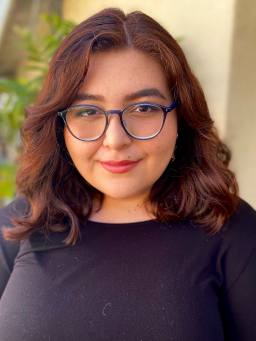Cohort 2021-2023
Latest News
Michelle Avila
Hometown: Inglewood, CA
Major(s): Art History and Archaeology
Graduate Interests: Art History, Women in Art
Scholarships and Academic Awards: The Middle-Class Scholarship (MCS)
MMUF Mentor: Dr. Kirstin Ellsworth
Research Project Title: Fat Women in Art: A Look into the Depictions of Gendered Fatness through the Female Gaze and the Male Gaze
Research Project Abstract: The female body has traditionally been a famed subject for the gazes of artists, models, and audiences. As the female body became a preferred artist subject, the depictions of diverse body shapes diminish. As a result, western society began to uphold unrealistic standards of beauty when painting women in art. Due to these unrealistic standards, the male gaze further portrays fat women in inaccurate perspectives that demonstrate them as subjects of mockery, misrepresentation, and over-sexualization. On the contrary, female artists presumably embody the fullness of their female muses. Artists like Artemisia Gentileschi (1610–1653) strive to reject the typical male gaze to create diverse depictions of women. Gentileschi utilizes her strengths as a woman and as an artist to produce art that diminishes the portrayal of inferior women in 17th-century art by depicting fat women in positions of power. This research will explore fat female bodies in the art of Artemisia Gentileschi and Peter Paul Rubens to demonstrate the differences between the male gaze and the female gaze. The goal of this project is to argue that art created by the female artist's gaze may portray larger bodies without the alleged compartmentalized views of the male gaze. In conclusion, by delivering research on diverse female subjects, the narrative of what it means to be a woman in art can shift to prove that representation matters.

Daniella Enriquez
Hometown: Santa Ana, CA
Major(s): History
Minor: Art History & Communications
Graduate Interests: 20th Century United States History
Scholarships and Academic Awards: Dean’s Honor Roll List
MMUF Mentor: Dr. Kate Fawver
Research Project Title: “Prohibition’s Unintended Consequences”
Research Project Abstract: Prohibition came after the ratification of the eighteenth amendment, which prohibited the manufacture, sale, and transportation of alcohol. The passage of the eighteenth amendment was piloted by a religious movement; however, anti-immigration sentiment and policy were also a primary driver. My research will examine how Prohibition impacted the lives, experiences, and opportunities of immigrants in New York. Prohibition impacted the saloons leading to the rise of speakeasys. The Federal Bureau of Investigation and the Border Patrol utilized enforcing mechanisms to implement the eighteenth amendment and its impact on the immigrant communities in New York. Furthermore, immigrants found economic opportunities sidestepping federal law prohibiting alcohol consumption and distribution. Immigrants arriving to the United States were directly affected by Prohibition because they had limited job opportunities: low-wage construction, dock jobs, and other types of manual labor. Saloons were places of hospitality where immigrants could connect with others from their home countries and provide new immigrants with food for survival. During Prohibition, the United States emerged from its involvement in World War I, experienced the roaring twenties, and underwent the beginning of the Great Depression.

Caitlin McClister
Hometown: Torrance, CA
Major: History
Minor(s): Political Science and Anthropology
Graduate Interests: I intend to pursue a Ph.D. in history with a specialization in 20th Century U.S. Foreign Relations and war as a source of socioeconomic and cultural change.
Scholarships and Academic Awards: Dean's List, UMG Lew Wasserman Scholarship, Phi Alpha Theta National History Honors Society, History Club President, California Promise Finish in Four Scholars Program
MMUF Mentor: Dr. Christopher Monty
Research Project Title: "American Duplicity: How Humanitarian Aid Bypassed Millions"
Research Project Abstract: World War II will forever be one of the most horrific events in our world history. About seventy-five million people died from a large variety of causes. Six million of those people were European Jews. For Americans, the war really started in 1941 with the bombing of Pearl Harbor. The reality is that World War II started in 1939. As information has unfolded, and the contribution of the United States in terms of aid to European Jews has come under investigation numerous times. The role of President Franklin D. Roosevelt’s administration and the various American voluntary associations that were responsible for providing aid have already been researched. The International Committee of the Red Cross has also released their records, providing some controversy about their supposed positive impact on victims of Nazism. Regardless, it is clear that not enough was done. My research focuses on a different aspect of this topic that has not been examined thoroughly. I will analyze how the relationship between the FDR administration and the American Red Cross directly impacted the aid given to European Jews during World War II. This will involve looking at specific individuals within President Roosevelt’s administration and the American Red Cross, as well as defining the relationship based off of the correspondence between them. I hope to provide a clearer understanding of what occurred during these years, and fill in the gaps that led to the millions of people left to suffer through the Holocaust.
